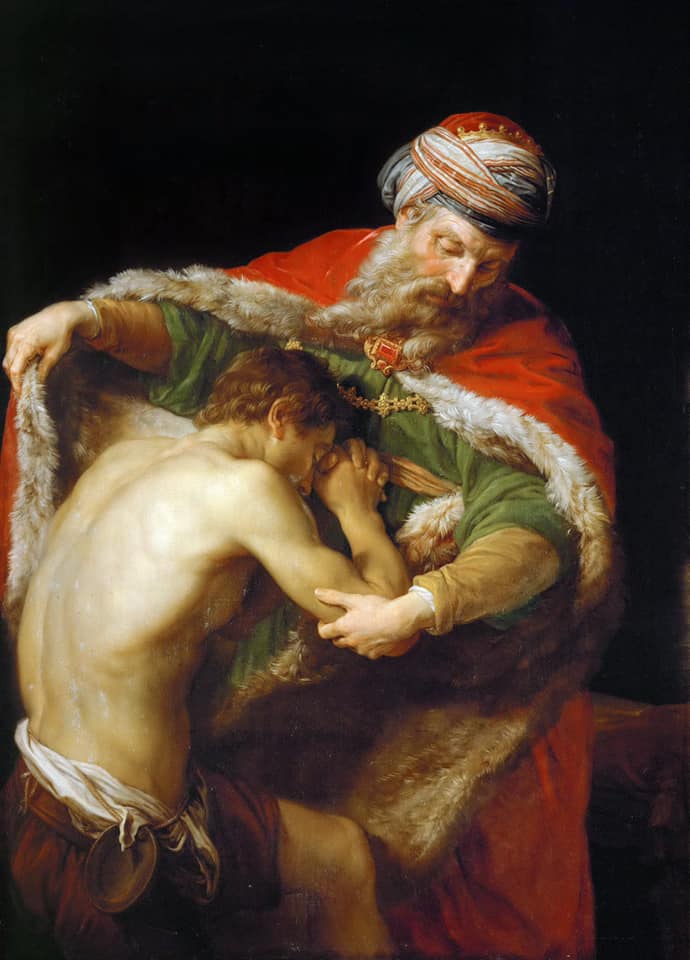 Gospel for 14 March 2020
Gospel for 14 March 2020
Saturday of the Second Week of Lent
Luke 15:1-3,11-32
The prodigal son
The tax collectors and the sinners were all seeking the company of Jesus to hear what he had to say, and the Pharisees and the scribes complained. ‘This man’ they said ‘welcomes sinners and eats with them.’ So he spoke this parable to them:
‘A man had two sons. The younger said to his father, “Father, let me have the share of the estate that would come to me.” So the father divided the property between them. A few days later, the younger son got together everything he had and left for a distant country where he squandered his money on a life of debauchery.
‘When he had spent it all, that country experienced a severe famine, and now he began to feel the pinch, so he hired himself out to one of the local inhabitants who put him on his farm to feed the pigs. And he would willingly have filled his belly with the husks the pigs were eating but no one offered him anything. Then he came to his senses and said, “How many of my father’s paid servants have more food than they want, and here am I dying of hunger! I will leave this place and go to my father and say: Father, I have sinned against heaven and against you; I no longer deserve to be called your son; treat me as one of your paid servants.” So he left the place and went back to his father.
‘While he was still a long way off, his father saw him and was moved with pity. He ran to the boy, clasped him in his arms and kissed him tenderly. Then his son said, “Father, I have sinned against heaven and against you. I no longer deserve to be called your son.” But the father said to his servants, “Quick! Bring out the best robe and put it on him; put a ring on his finger and sandals on his feet. Bring the calf we have been fattening, and kill it; we are going to have a feast, a celebration, because this son of mine was dead and has come back to life; he was lost and is found.” And they began to celebrate.
‘Now the elder son was out in the fields, and on his way back, as he drew near the house, he could hear music and dancing. Calling one of the servants he asked what it was all about. “Your brother has come” replied the servant “and your father has killed the calf we had fattened because he has got him back safe and sound.” He was angry then and refused to go in, and his father came out to plead with him; but he answered his father, “Look, all these years I have slaved for you and never once disobeyed your orders, yet you never offered me so much as a kid for me to celebrate with my friends. But, for this son of yours, when he comes back after swallowing up your property – he and his women – you kill the calf we had been fattening.”
‘The father said, “My son, you are with me always and all I have is yours. But it was only right we should celebrate and rejoice, because your brother here was dead and has come to life; he was lost and is found.”’
Reflexion
What the younger son had lost was not just the wealth he had squandered, nor all his worldly possessions due to him as his inheritance but the ability to cherish his father’s undying love for him which could not be extinguished nor diminished by his betrayal and rejection.
Such is the extent of the Father’s love seen in the words spoken to his elder son, “you are with me always and all I have is yours.”
The fabulous truth of this parable is found in these amazing words. In times when we doubt God’s presence, in times when we struggle with a sense of His absence in our daily lives, in times of dark hopelessness, for the many times we have turned our backs on Him and left in search of other false gods and empty substitutes, He has never abandoned us.
Our God patiently and faithfully awaits our return, our gradual enlightenment, our acknowledgement that nothing else in this world can replace His love for us. He waits patiently for the sinner to come to his senses, and even when we do so imperfectly, He makes every concession to see that we are finally “home” where we belong.
Once we realise this, then the answer to the rhetorical question which the prophet Micah poses in the first reading comes easy, “what god can compare with you: taking fault away; pardoning crime; not cherishing anger for ever but delighting in showing mercy?” There is no other god like our Lord God, our beloved Father in Heaven.
Our public masses have been suspended and it does appear that our churches are empty. But we know that they are never really empty, our Lord Jesus Christ, the Beloved Son who never turned His back on the Father, is present and He lovingly and longingly awaits our return. He awaits the day when we will join Him once again to celebrate the Father’s love, worship Him in Truth and Spirit, and be made partakers of the banquet prepared for those who were once lost but now found, those who were once dead but have come back to new life.
